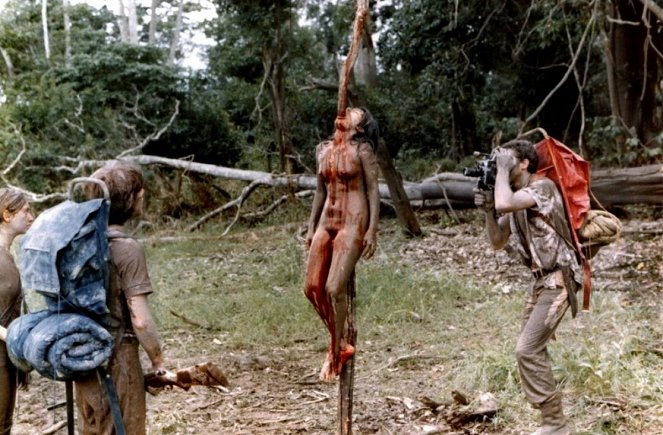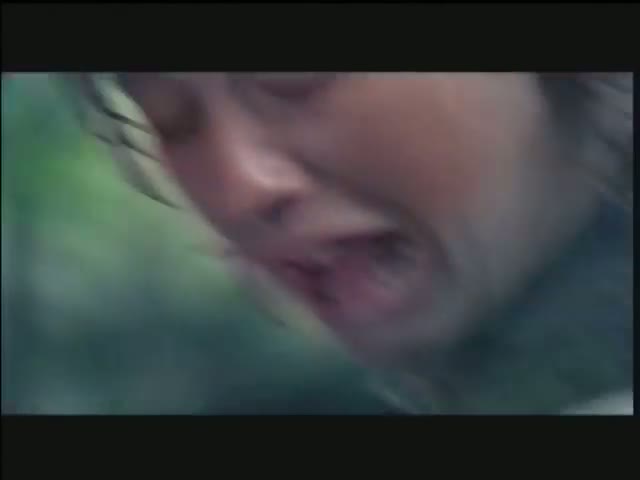Directed by:
Ruggero DeodatoScreenplay:
Gianfranco ClericiCinematography:
Sergio D'OffiziComposer:
Riz OrtolaniCast:
Robert Kerman, Francesca Ciardi, Perry Pirkanen, Luca Barbareschi, Salvatore Basile, Carl Gabriel Yorke, Ruggero Deodato, Paolo Paoloni, Luigina Rocchi (more)VOD (1)
Plots(1)
Set in the Amazonian jungles, the film is a pseudo-documentary that follows Professor Harold Moore (Robert Kerman) into the "Green Inferno" as he searches for a documentary crew that came to the jungle the previous year to make a film about the storied cannibals that lived there, and never made it back. Now, Moore meets some natives and discovers the footage from the crew's expedition, and upon returning to New York, he watches it to find out what really happened. The truth is too horrible for words, proving that savagery is not limited to indigenous peoples, and the morally outrageous film proceeds to indict the exploitative practices of certain documentary practices. (official distributor synopsis)
(more)Videos (2)
Reviews (8)
A visual-narrative experiment that is easy to dismiss for a certain self-evident and blatantly trivial idea, but it’s important to remember that Cannibal Holocaust is not a film that ever had or will ever have the intention to appeal to a wide audience and declaim its message at the expense of its mostly barbaric and unspeakable visual form. No, Cannibal Holocaust is a minimalist and distinctive piece of filmmaking, a self-conscious conveyor of a "real story" in such a realistic way that it transcends the dimension of the generally accepted nature of the cinematic journey and becomes not only a controversial and deservedly infamous work, but also a unique probe into the twisted soul of filmmaking itself, where certain fans, myself included, will always find something new and disturbing. And yet, I rate it negatively. The level of brutality perfectly fits the overall scheme, and to denigrate its self-importance in this regard is utterly absurd, but the absolute lack of interest and zero emotional response towards the characters or the ensuing action that I continuously (un)felt throughout is as much a loss for the filmmakers in the case of this film as it is for David Lynch's films to be fully understood :))
()
The first half an hour was very uninteresting and boring, but after that the film was solid! Very bold and strong for its time. The shots of the turtle guts were the most disgusting thing I've ever seen. For me it's above average found footage, but it’s a very controversial film and I don't recommend it to everyone. 70%.
()
A (non)movie that is the embodiment of the term “controversial". Cannibal Holocaust is a hard movie to rate. It has no story, no actors either and the only thing that Cannibal Holocaust stands on is its “behind the scenes legend" about how (un)realistic the scenes are. It achieves its aim - to disgust - indisputably excellently, but at the same time it is a boring hundred minutes of tasteless masturbation about nothing. But still you learn something from it. Perhaps that nobody has the right to kill live animals for any kind of movie. But what if that wasn’t the point after all? You don’t know? Well nor do I. Perhaps you will uncover that proclaimed supposed philosophical side of it. Or perhaps not.
()
It’s not easy to rate this film. Does good porn deserve some stars just for giving me an erection? Should I consider it a good thing that a film insidiously pressed the buttons of my innermost and most intimate visceral instincts, making me feel loathsome and guilty (guilty for voluntarily, voyeuristically watching the most disgusting thing under the sun)? The last shot of the film evokes the feeling that the director truly achieved his objective and won. If that’s the case, then Cannibal Holocaust deserves not three stars, but five. But that is VERY questionable and I would rather not rate this film at all. Because if that is not the case, they should burn every last copy of it.
()
I wonder who the real cannibals are... A combination of cinema verité and film à thèse. Heart of Darkness transferred into (post) modernity, a film that, with its limited possibilities, constantly tries to reflect on itself (the documentary is actually a transfer of the principle of film itself into the fictional world) and raises the question of instinct / violence / civilization mechanisms that supposedly keep us away from our primitive nature, but in fact they are constantly subject to it (often in the name of nobility). It's not deeply academic - rather clearly schematic - and in places it is not filmed very deftly, but it just makes sense and it has a message - if we can abstract from the outrage that someone has the audacity to kill a pig or a turtle in the name of the film, we will soon find out that film consciously deals with this "just outrage". More precisely, what hides behind it.
()
Gallery (38)
Photo © Vapet Productions



Ads